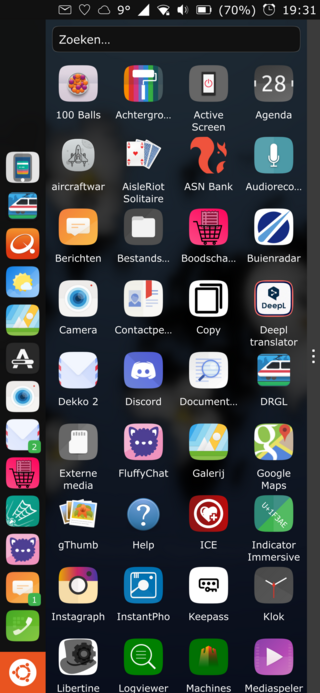WeatherBug is a brand based in New York City that provides location-based advertising to businesses. WeatherBug consists of a mobile app reporting live and forecast data on hyperlocal weather to consumer users.

A smartwatch is a portable and wearable computer device in a form of a watch; modern smartwatches provide a local touchscreen interface for daily use, while an associated smartphone app provides management and telemetry, such as long-term biomonitoring. While early models could perform basic tasks such as calculations, digital time telling, translations, and game-playing, smartwatches released since 2015 have more general functionality closer to smartphones, including mobile apps, a mobile operating system, and WiFi/Bluetooth connectivity. Some smartwatches function as portable media players, with FM radio and playback of digital audio and video files via a Bluetooth headset. Some models, called watch phones, have mobile cellular functionality such as making telephone calls.

MIUI is a deprecated mobile operating system by Xiaomi for its smartphones and devices, from 2010 to 2023, prior to the launch of its successor Xiaomi HyperOS.

ClockworkMod is a software company, owned by Koushik "Koush" Dutta, which develops various software products for Android smartphones and tablets. The company is primarily known for its custom recovery image, ClockworkMod Recovery, which is used in many custom ROMs.

OsmAnd is a map and navigation app for Android and iOS. It uses the OpenStreetMap (OSM) map database for its primary displays, but is an independent app not endorsed by the OpenStreetMap Foundation. It is available in both free and paid versions; the latter unlocks the download limit for offline maps and provides access to Wikipedia points of interest (POIs) and their descriptions from within the app. Map data can be stored on the device for offline use. Using the device's GPS capabilities, OsmAnd offers routing, with visual and voice guidance, for car, bike, and pedestrian. All of the main functionalities work both online and offline.

AliOS is a Linux distribution developed by Alibaba Cloud, a subsidiary of Mainland Chinese company Alibaba Group. It is designed for smart cars and Internet of Things (IoT) devices, and it had been used as a mobile operating system.

MyTracks was a Global Positioning System (GPS) tracking application that ran on Android. The application used a device's GPS capabilities to collect data, allowing real-time review of path, speed, distance, and elevation. Later, this data could be saved to Google Maps, Google Fusion Tables, or Google Docs and shared with Google+, Facebook, or Twitter. The application also allowed a user to record annotations along the path, hear periodic voice announcements of progress, and sync with select third-party bio-metric sensors.

Ubuntu Touch is a mobile version of the Ubuntu operating system, being developed by the UBports community. Its user interface is written in Qt, and is designed primarily for touchscreen mobile devices such as smartphones and tablet computers, but the original goal of convergence was intended to bring Ubuntu Touch to laptops, desktops, IOT devices and TVs for a complete unified user experience.

F-Droid is an open-source app store and software repository for Android, serving a similar function to the Google Play store. The main repository, hosted by the project, contains only free and open source apps. Applications can be browsed, downloaded and installed from the F-Droid website or client app without the need to register for an account. "Anti-features" such as advertising, user tracking, or dependence on non-free software are flagged in app descriptions.

Open Whisper Systems was a software development group that was founded by Moxie Marlinspike in 2013. The group picked up the open source development of TextSecure and RedPhone, and was later responsible for starting the development of the Signal Protocol and the Signal messaging app. In 2018, Signal Messenger was incorporated as an LLC by Moxie Marlinspike and Brian Acton and then rolled under the independent 501c3 non-profit Signal Technology Foundation. Today, the Signal app is developed by Signal Messenger LLC, which is funded by the Signal Technology Foundation.
This article contains a list with gratis satellite navigation software for a range of devices. Some of the free software mentioned here does not have detailed maps or the ability to follow streets or type in street names. However, in many cases, it is also that which makes the program free, avoid the need of an Internet connection, and make it very lightweight. Very basic programs like this may not be suitable for road navigation in cars, but serve their purpose for navigation while walking or trekking, and for use at sea. To determine the GPS coordinates of a destination, one can use sites such as GPScoordinates.eu and GPS visualizer.
Eddystone was a Bluetooth Low Energy beacon profile released by Google in July 2015. In December 2018 Google stopped delivering both Eddystone and Physical Web beacon notifications. The Apache 2.0-licensed, cross-platform, and versioned profile contained several frame types, including Eddystone-UID, Eddystone-URL, and Eddystone-TLM. Eddystone-URL was used by the Physical Web project, whereas Eddystone-UID was typically used by native apps on a user's device, including Google's first party apps such as Google Maps.

LineageOS is an Android-based operating system for smartphones, tablet computers, and set-top boxes, with mostly free and open-source software. It is the successor to CyanogenMod, from which it was forked in December 2016, when Cyanogen Inc. announced it was discontinuing development and shut down the infrastructure behind the project. Since Cyanogen Inc. retained the rights to the Cyanogen name, the project rebranded its fork as LineageOS.

postmarketOS is an operating system primarily for smartphones, based on the Alpine Linux distribution.
Haven is a free and open-source security application for Android designed to monitor activity occurring in the vicinity of a device using its built-in sensors, and to alert the device owner of such activity. Haven was co-developed by Edward Snowden, and The Guardian Project, under the auspices of Freedom of the Press Foundation.

MicroG is a free and open-source implementation of proprietary Google libraries that serves as a replacement for Google Play Services on the Android operating system. It is maintained by German developer Marvin Wißfeld. In a presentation, Wißfeld described microG as "the framework to create a fully-compatible Android distribution without any proprietary Google components".











